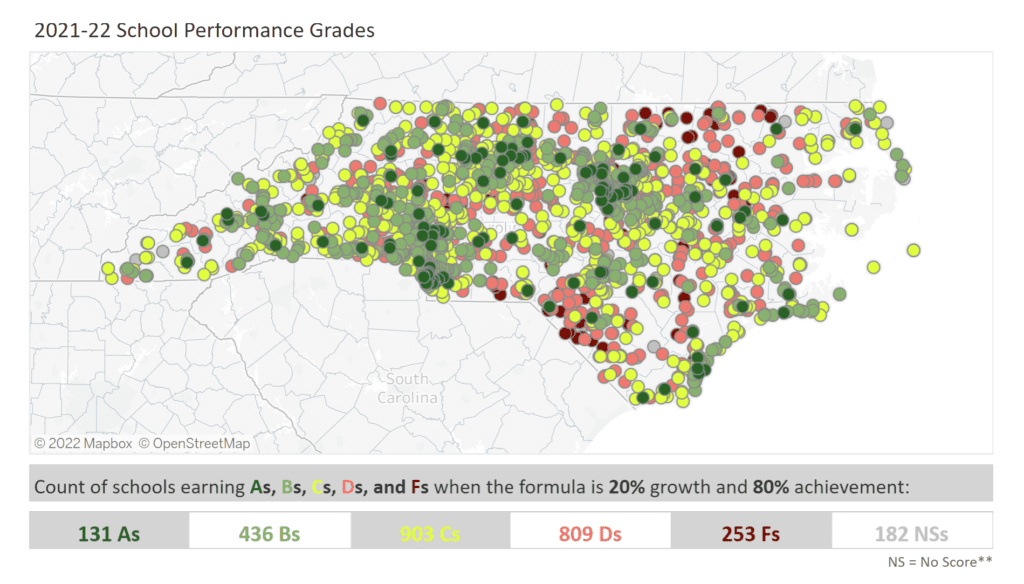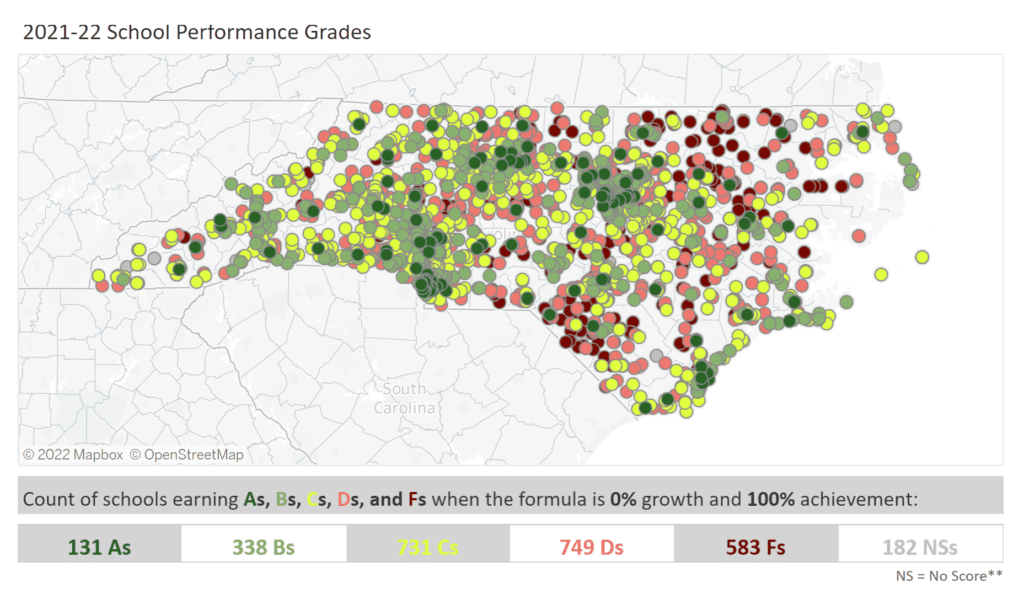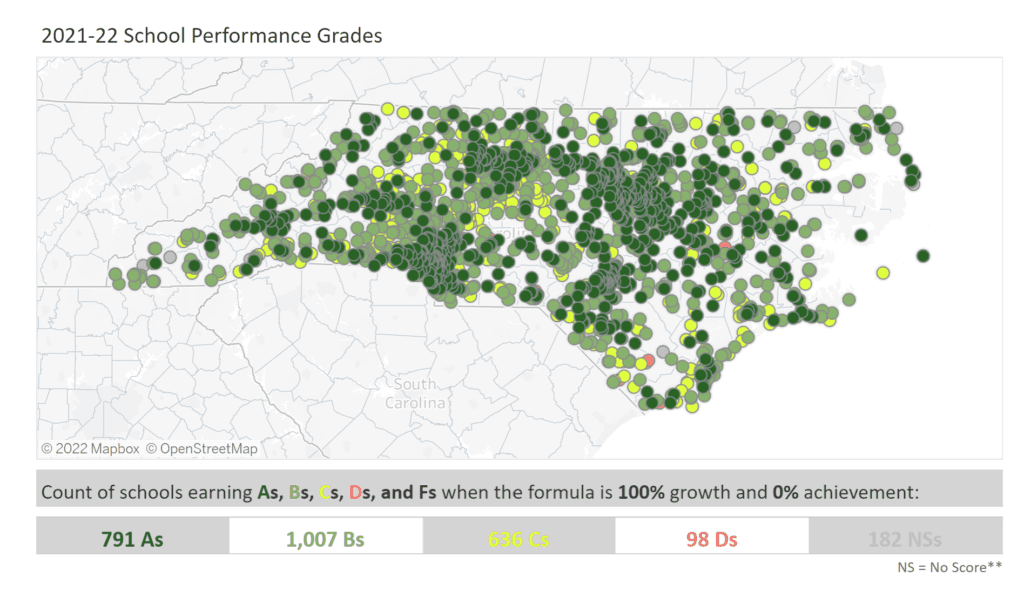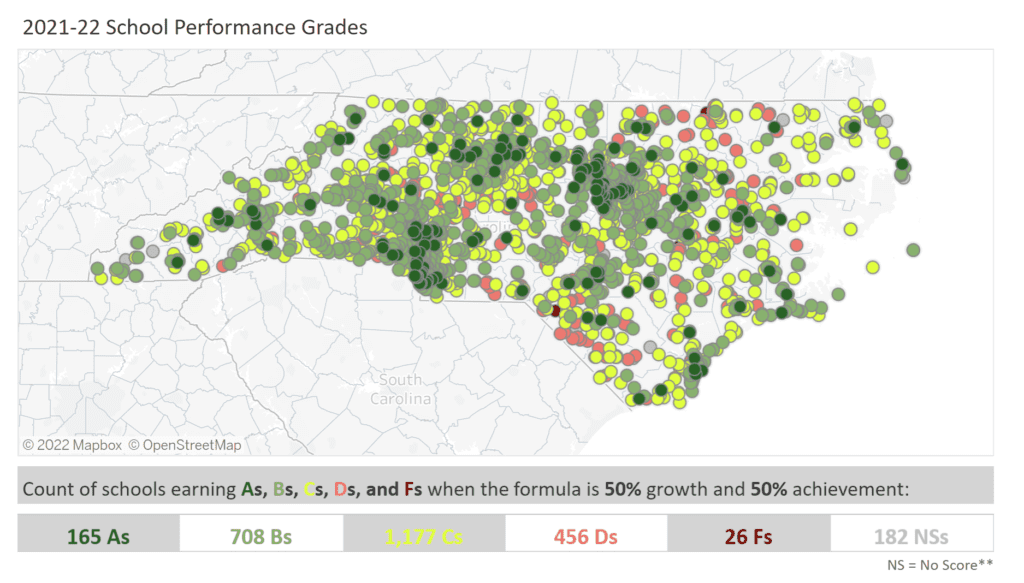

Share this story
|
|
A recent report by the Education Policy Initiative at Carolina (EPIC) said plainly, “North Carolina’s current school accountability model does not provide an accurate depiction of how schools perform.”
The North Carolina Department of Public Instruction has convened an advisory group to consider changes in testing and accountability. Thank you to those of you who took our recent survey. Here is another way for you to weigh in.
EdNC just released our latest map on school grades across North Carolina, thanks to our favorite mapper Emily Antoszyk. She has been mapping school grades for us since 2013-14.
Click on this article to see the map, read about how the map works (note you can filter by district or school), and see past maps:
Our map gives you control
The power of our map is that it gives you control. Currently, according to legislation, academic achievement makes up 80% of a school’s grade, and school growth makes up the other 20%. With our map, you get to choose the percentages based on your values to see how the grades change — statewide and for particular schools.
Take a look at the map, and then create your own map. Take a screenshot and share it with us on Twitter @EducationNC.
This is the map with 80% achievement and 20% growth and the 15-point scale as required currently by law. Notice the number of of A, B, C, D, and F grades below the map as the formula is changed.


This is the map with 100% achievement.


This is the map with 100% growth. There are no F schools with this formula.


This is the map with 20% achievement and 80% growth. There are no F schools with this formula.


This is the map with 50% achievement and 50% growth. There are 26 F schools with this formula.


EdNC worked with Antoszyk to create this map to empower all of you to take a deeper look at how these public policy choices — to have school grades and to use the existing 80/20 split — impact our perception of our schools.
Other states and school accountability
The Education Commission of the States provides this 50-state resource on school accountability systems. They note it is important to think first about what the purpose of the system is to you from sharing information about schools and districts to measuring progress toward local and state goals to supporting educational equity.
The ECS report also will help you understand what federal law requires of state accountability systems. It notes that while federal law “requires states to report on school performance information… it does not prescribe the type of report card or rating systems that states use.” You will see in their study that this federal flexibility in implementation has allowed states to try A-F grades, like North Carolina’s current system, but also descriptive reports, index ratings, 1-5 stars systems, dashboards, and federal tiers of support.
The need for a multi-faceted measure and why mislabeling school effectiveness matters
Here is EPIC’s recent report, “Making the Grade.”
Consider how EPIC talks about the purpose of school grades:
The fundamental purpose of a school accountability model should be identifying, to the extent possible, the effectiveness of schools at meeting the goals of public education. When the accountability system measures school effectiveness, states, districts, and schools have more accurate information to guide decisions around school supports and recognition. Furthermore, families have a clearer understanding of the quality of their child’s school.
The EPIC report finds:
North Carolina’s current school accountability model does not provide an accurate depiction of how schools perform. The heavy weighting of test proficiency means that schools are judged on factors beyond their control, such as the prior experiences of their students and challenging situations like the pandemic. Achievement growth, on the other hand, represents what students are gaining through their experiences at school, regardless of where they come from and other factors in their lives and the world around them. Mislabeling school effectiveness matters because stakeholders — e.g. state and district officials, school administrators, teachers, and families — react to these labels in ways that may impact future school performance. Furthermore, educators in high growth schools deserve recognition for their efforts to support their students and educators and students in low growth schools deserve supports to ensure that every student is learning and growing at school.
The EPIC researchers hope:
North Carolina creates an accountability model that prioritizes what schools more directly control and that North Carolina recognizes that school effectiveness is a multi-faceted measure. Quality schools benefit from a range of outcomes for students, educators, and families and those measures can be included in a more comprehensive school accountability model.
What matters to you?
To parents wondering how to think about the letter grade of your child’s schools, start by considering how your child is doing at school. When my child attended a “D” school, here is how I thought about it. If your child is not doing well at a school, then that is a problem. But the letter grade is not a problem in and of itself, and flight from a school just because of the letter grade is not the answer. As always, we need our parents circle in and invest your time, energy, and resources in our schools in positive ways so that every child has access to a high-quality education.
We hope parents, educators, school administrators, and policymakers will use our map and this research to imagine a school accountability system you’d believe in and to participate in a conversation about how our current system of measuring school performance should be changed. And remember, you aren’t limited to achievement and growth! What matters to you?





